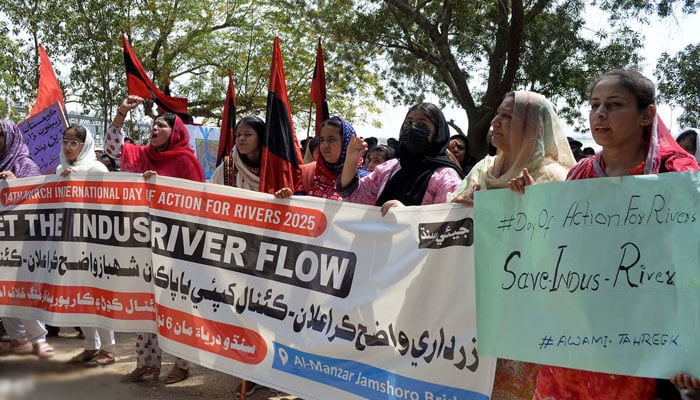Resource talk
Ultimately, resource management must be grounded in transparency, equity and inclusive decision-making
There’s a lot of talk these days about provincial resources and autonomy, primarily due to the federal government’s controversial plan to construct six canals on the Indus River to irrigate the Cholistan desert. The PPP has vehemently opposed the project, arguing that it will deprive Sindh of its water rights. Sindh Chief Minister Murad Ali Shah has even gone so far as to say that if the government does not consider Sindh’s point of view, “we will not waste a minute to leave the federal government.” Troubling developments, indeed. On the one hand, we have the PML-N government’s largest coalition partner at the centre threatening to quit over the canal project. On the other, the Khyber Pakhtunkhwa Mines and Minerals Bill 2025 has stirred controversy – despite the PTI-led government in KP defending it. A white paper outlining the bill’s main features and objectives was released by the KP government on Tuesday. Chief Minister Ali Amin Gandapur clarified that the proposed amendments do not seek to transfer provincial authority to any other entity, claiming that misinformation is being spread regarding the law by a “certain mafia” for personal gain. Aside from some PTI leaders, opposition has also come from Maulana Fazlur Rehman’s JUI-F, the ANP, and PkMAP, all of whom have strongly criticised the proposed legislation, calling it a blatant attack on provincial autonomy and rights.
Regardless of specific laws, the fact is that provincial resources are a sensitive issue and must be handled delicately. Decades of denying Balochistan its economic rights have alienated its population, something that must not be repeated in any other province. While the 18th Amendment paved the way for greater provincial autonomy, challenges remain, such as the ongoing canal project dispute in Sindh. However, unlike Sindh and Balochistan, KP’s PTI-led government is defending the proposed bill and insists that it does not compromise the province’s autonomy. Observers point out that there is no love lost between the PTI government in KP and the PML-N government at the centre. Thus, for Gandapur to publicly support this bill suggests it may not be as problematic. Meanwhile, the PTI has oddly stated that the bill will only be passed after thorough consultation and with the formal approval of PTI founder Imran Khan. Why a provincial government should be beholden to its party leader belies reason. Should it not be a given that a provincial government functions independently in matters of governance?
According to analysts and reporters, the process of drafting this proposed legislation began under the harmonisation framework of the Special Investment Facilitation Council (SIFC). The initial draft was circulated to the provinces in May 2024 for feedback. After about a year of consultation and several iterations incorporating input from relevant departments, the KP government tabled the bill this month. The KP government states that the legislation aims to align mining regulations with those of the federal government and other provinces. However, experts argue that some criticism of the bill is valid, particularly clauses that appear to empower the federal government over the province in matters related to minerals. They also emphasise that any access granted to foreign entities regarding Pakistan’s mineral resources must be strictly monitored. US Secretary of State Marco Rubio raised prospects for engagement on critical minerals and expressed interest in expanding commercial opportunities for US companies during his maiden telephone conversation with Foreign Minister Ishaq Dar. A two-day Pakistan Minerals Investment Forum 2025 (PMIF25) was also held in Islamabad, where Prime Minister Shehbaz Sharif invited both domestic and international investors to invest in Pakistan’s vast natural resources. While development is essential, it must not come at the cost of provincial rights, especially in a federation as diverse and sensitive as Pakistan’s. Ultimately, resource management must be grounded in transparency, equity and inclusive decision-making.
-
 China Cuts Anti-dumping Duties On Canadian Oil Imports After Final Trade Decision
China Cuts Anti-dumping Duties On Canadian Oil Imports After Final Trade Decision -
 Prince Harry, Meghan Markle Make Major Change To Strategy To Please Royal Family
Prince Harry, Meghan Markle Make Major Change To Strategy To Please Royal Family -
 Chester Bennington’s Mental Health Story And Lasting Legacy
Chester Bennington’s Mental Health Story And Lasting Legacy -
 John Cusack Gears Up To Give Fans Exciting Surprise On Late-night Television
John Cusack Gears Up To Give Fans Exciting Surprise On Late-night Television -
 Yerin Ha Opens Up About Shocking Diagnosis Post ‘Bridgerton’ Season 4
Yerin Ha Opens Up About Shocking Diagnosis Post ‘Bridgerton’ Season 4 -
 Meghan Markle, Harry Leave King Charles, Prince William Furious With Latest Move
Meghan Markle, Harry Leave King Charles, Prince William Furious With Latest Move -
 NASA Announces New Artemis Moon Mission Aimed At Expanding Astronauts’ Exploration Efforts
NASA Announces New Artemis Moon Mission Aimed At Expanding Astronauts’ Exploration Efforts -
 Everything To Know About Justin Bieber's Facial Paralysis
Everything To Know About Justin Bieber's Facial Paralysis -
 Morgan Stanley Predicts AI To Replace Tasks Not Workers
Morgan Stanley Predicts AI To Replace Tasks Not Workers -
 Anthropic Dario Amodei Calls White House Response ‘retaliatory’ In AI Safety Dispute
Anthropic Dario Amodei Calls White House Response ‘retaliatory’ In AI Safety Dispute -
 Tia Mowry Breaks Silence On Angelina Jolie Asking 'unbelievably' Personal Question: 'Wilder'
Tia Mowry Breaks Silence On Angelina Jolie Asking 'unbelievably' Personal Question: 'Wilder' -
 Savannah Guthrie Speculations 'sadly' Coming True About Mother Nancy
Savannah Guthrie Speculations 'sadly' Coming True About Mother Nancy -
 Trump Administration Warns Of Slow Payouts For Tariff Refunds Amid Intensifying Trade Disputes
Trump Administration Warns Of Slow Payouts For Tariff Refunds Amid Intensifying Trade Disputes -
 Princess Beatrice 'far From Comfortable' After Father Andrew's Arrest
Princess Beatrice 'far From Comfortable' After Father Andrew's Arrest -
 Sarah Ferguson’s Dual Cancer Journey
Sarah Ferguson’s Dual Cancer Journey -
 GTA 6 Security: Rockstar Blocks Leaks Ahead Of Launch
GTA 6 Security: Rockstar Blocks Leaks Ahead Of Launch




